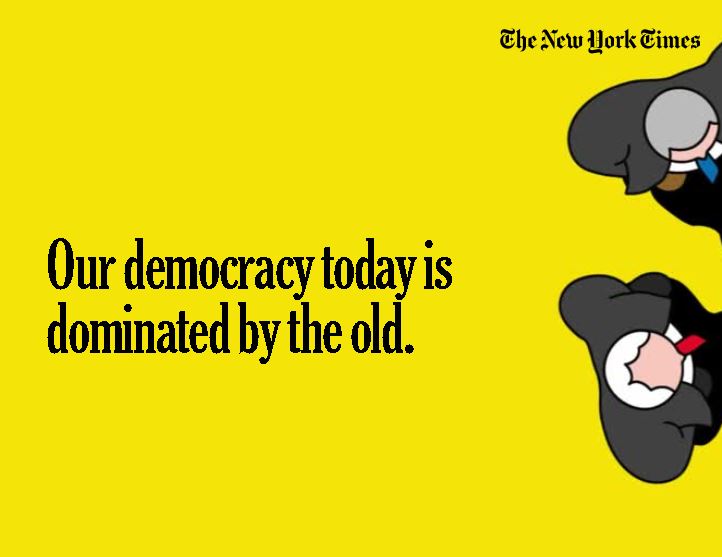The New York Times devoted three full pages of valuable Sunday Review real estate (the full front page and two full inside pages) to a left-wing, ageist, anti-Trump voter lament disguised (not too well) as a call for the political empowerment of youth via a lowering of the voting age: “They’ve Got The Whole World In Their Hands.” “Old people have the money and the power. Young people have been left out. But for how long?”
It’s written by Astra Taylor, a Puffin Foundation/Economic Hardship Reporting Project fellow. The online headline? “Out With the Old, In With the Young.” (AARP, call your office.)

It at least began in bipartisan fashion.
It’s not just that President Trump is a well-seasoned 73 and his three top Democratic Party challengers are also septuagenarians. The average senator is now almost 63 and the average member of the House nearly 58, making them roughly 20 years older than their average constituent, and nearly a decade older than they were in 1981.
Older people today hold disproportionate power because they have the numbers and the means to do so. People 65 and older, for example, are more than three times as likely to make political donations as those under 30. As a result, their voices, amplified by money, carry farther politically than those of the young and impecunious.
It's clearly an ideological argument disguised as a generational one; not even an argument -- just an assumption that good = liberal, and liberal = young:
While significant divisions exist within every age cohort (many older people in this country are progressive and poor, just as some young people are rich and right-wing), the divisions between older and younger generations are becoming increasingly salient. Of course, young people are not intrinsically enlightened or virtuous compared to their elders -- as someone who just turned 40, I certainly hope that’s not the case -- and our society desperately needs older people to participate in public life.
....The lack of intergenerational justice, of equity between the young and old, is an underappreciated facet of the current turmoil: A hoary establishment hoards influence, curtailing young people’s ability to effect change.
....
....On a range of issues, including global warming, gun control, economic inequality, racism, immigration and trans rights, youth-led movements are creating a generational insurgency.
Rants about “ecological disaster” and “Gilded Age levels of inequality” were followed by some radical proposals, delivered with anti-Trump spin. Taylor’s source even worked Brexit into the mix with a tasteless jab at pro-Brexit voters being "not long for this earth."
David Runciman, a professor of politics at Cambridge, disagrees with mainstream public sentiment. The structural disenfranchisement of young people, he argues, must be remedied by even more drastic measures. His proposal: Enfranchise everyone over the age of 6. “What’s the worst that could happen?” he asked on a podcast last year. Given the current president of the United States, it’s not clear that letting kids vote would yield worse outcomes than what adults have delivered.
For Professor Runciman, the fundamental issue is fairness. He points to the 2016 Brexit vote, in which 73 percent of the 18-24 age group cast a ballot for Remain when more than 60 percent of 65 and older voted Leave. Hundreds of thousands of people who were too young to vote will have to spend their entire lives dealing with the repercussions of a nostalgic, ill-considered decision made by people not long for this earth.
Sixteen seems a reasonable time to start. And lowering the voting age might also encourage more young people to run in the local and state races where the Constitution’s age restrictions do not apply.
(Lowering the voting age, whether crazily (6) or merely irresponsibly (16), is an odd stand in favor of adult responsibilities when displayed in a newspaper that favors children being listed as dependents on their parents’ health insurance until the age of 26.)
If our goal is to break the grip of the coming gerontocracy, giving more teenagers access to the ballot is a necessary but insufficient step. The inequities that result from the role of money in politics and our geographically based electoral system also need to be remedied. Otherwise, the power structure will keep pandering to older -- and whiter and more affluent -- voters.
Taylor squeezed “campaign finance reform and a more proportional system of representation” under her youth vote rubric. A chart of how the generations stand on political issues included only liberal issues, including “free college for all students” and “Medicare Expansion.” The subtext: Greedy, free-market-supporting geezers are in the way of a generous-spending big-government paradise.
One issue not covered: Social Security reform, truly a giveaway to the old from the young. Yet in the past the paper has stuck up for senior citizens getting their full benefits, most notably during George W. Bush’s attempt at Social Security reform.





